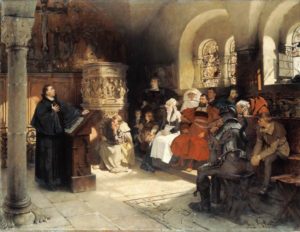Martin Luther preached:
[L]earn diligently and note well that they do not receive the Sacrament unworthily who confess to be wretched sinners, feel all kinds of temptations, curse from time to time, become impatient, do not always eat and drink in moderation, and then pray for mercy: Help me, Lord, to amend my ways and become godly. These are the day-to-day sins which cleave to us, to some more than to others, because we live on the earth. Do not say you would not go to receive the Sacrament because of such sins. For as long as the “old Adam” is on your back, you will without doubt encounter temptations to impatience, evil thoughts, and other things, and commit sins. Now if you purpose not to receive the Sacrament until you are free of all sins, then it must follow that you would never, ever go to the Lord’s Supper.
 Now those receive the host unworthily who are willfully in sin, such as the homicidal hatred of another, murder, whoredom, adultery, and other such open sin, and still do not intend to stop. For the Sacrament was instituted by the Lord Christ, not to perpetuate sin but for us to obtain forgiveness of sins and to become more godly. Consequently, Judas took the Sacrament to his death and judgment, because he had determined to betray and sell the Lord Jesus, and he continued in this resolve and stubborn evil intent. …
Now those receive the host unworthily who are willfully in sin, such as the homicidal hatred of another, murder, whoredom, adultery, and other such open sin, and still do not intend to stop. For the Sacrament was instituted by the Lord Christ, not to perpetuate sin but for us to obtain forgiveness of sins and to become more godly. Consequently, Judas took the Sacrament to his death and judgment, because he had determined to betray and sell the Lord Jesus, and he continued in this resolve and stubborn evil intent. …
It is a completely different kind of sin when the good-hearted now and then slip up and nevertheless repent, pray and wish: O that the Lord would forgive my sin, for I ha ve done wrong. Christ does not cast them away from his Supper, for the words testify that he does not want righteous and holy people, but poor sinners, who because of their sin do not know where to turn; these he does desire at his table. For so he declares, his body is given for them and his blood was poured out for their sins. Now these cannot be bad, inconsequential sinners for whom such an excellent sacrifice and redemption have been accomplished. Therefore, all that is necessary is that you confess from the heart to be a sinner, then take your place here and seek help. But the one who will not confess his sins or amend his ways has no place here. …
Therefore, St. Paul says, “Let a man examine himself, and so let him eat of this bread and drink of this cup.” And “examine” means nothing else than this: to consider well the disposition of your heart. If you find yourself in a stubborn state, not wanting to cease from your sins, and they do not trouble you, then you have reason not to go, for you are unworthy and no Christian. But if you see that you have sinned, and are sorry, would like to be free from sin, and believe that God desires to forgive you out of grace, for the sake of his Son Jesus Christ, then go, receive absolution and speak, Ah, Lord, I am a great sinner; therefore I come now to your Supper and want to eat with you. Do not doubt it, his reply to you is: Welcome my beloved friend; you shall be a worthy and dear guest; I will not strike you on the head.
Martin Luther, sermon delivered on Easter Wednesday, 1534
Eugene F. A. Klug (Editor) Sermons of Martin Luther: The House Postils, volume 2 50-52
